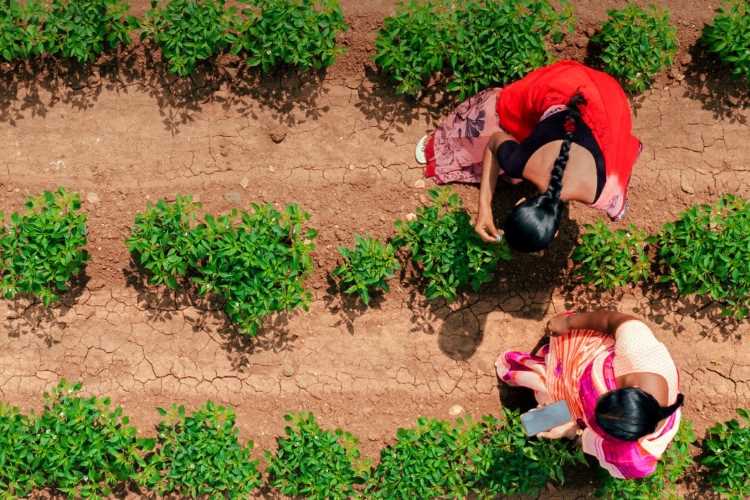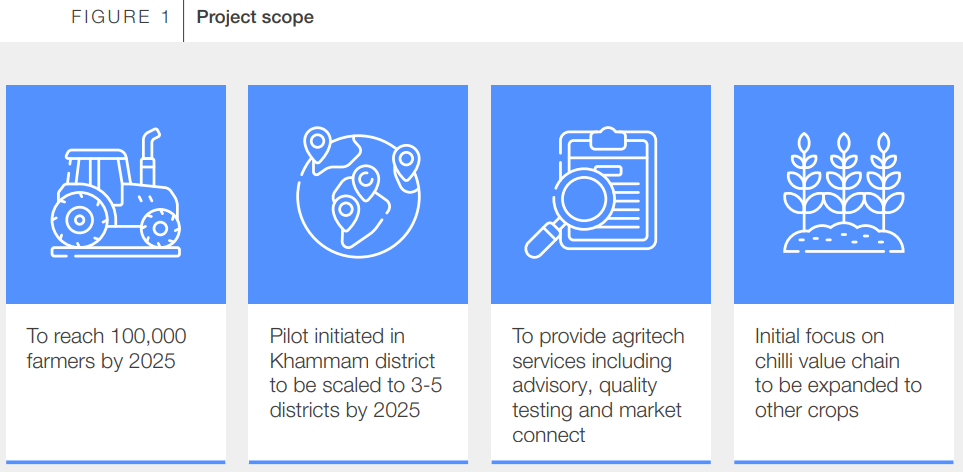
Project Saagu Baagu: India’s agricultural sector plays a vital role in ensuring food security and prosperity for its citizens. The sector faces numerous challenges, including climate change, natural disasters, soil degradation, and the economic impact of the COVID-19 pandemic. The need to support over 1.4 billion citizens of the world’s most populous country and uplifting the livelihoods of 500 million smallholder farmers demand a total transformation of India’s agriculture.
The World Economic Forum’s insight report, Scaling Agritech at the Last Mile: Converging Efforts for Farmers‘ Prosperity, explores the convergence of artificial intelligence and emerging technologies with agriculture, offering a brilliant opportunity for India to create a more agile, data-driven, and efficient agricultural sector. The report highlights the potential of agritech startups exploring solutions involving robotics, big data, smart equipment, internet-of-things sensors, and farm management software to unlock economic opportunities and increase productivity.
READ I India Sustainability Summit 2023: A forum for exchange of ideas, forging alliances
Saagu Baagu: Pioneering agritech revolution
The report discusses the groundbreaking initiative called “Project Saagu Baagu,” led by the Government of Telangana in partnership with the World Economic Forum, the Bill and Melinda Gates Foundation, and Digital Green. Telangana has made agriculture a priority sector, fuelling its growth in recent years. With an estimated 5 million farmers, the state has been transitioning from growing cereals to commercial crops, presenting challenges for small and marginal farmers.

Project Saagu Baagu aims to transform the state’s agriculture by leveraging emerging technologies in a scalable, inclusive, and sustainable manner. The project focuses on the chilli value chain in its first phase, intending to scale up and cover multiple districts and crops in subsequent phases. By providing customized advisory, quality testing, and e-commerce services to more than 7,000 farmers, Project Saagu Baagu has already made a positive impact on smallholder farmers’ income and well-being.
Role of public-private partnerships in agritech
Public-private partnerships are key to successful scaling of agritech in India. The report emphasizes the critical role of governments in creating an enabling environment for agritech startups to thrive. Data enablement, support for on-ground operations, creating domain knowledge, and convergence with existing government schemes are essential preconditions for PPPs to drive the widespread adoption of emerging technologies.
Data-driven agriculture is a cornerstone of agritech solutions. By leveraging existing government datasets and providing access to reliable data, agritech startups can develop more tailored services for farmers. Additionally, support for on-ground operations, such as last-mile delivery channels, can help reach smallholder farmers efficiently and effectively.
Creating domain knowledge is equally crucial. Many agritech startups are tech specialists without agricultural expertise. By fostering collaboration between startups and agricultural experts, governments can ensure that solutions are well-informed and designed to address the specific challenges faced by farmers.
Convergence with government schemes is essential to capitalize on existing resources and infrastructure. Governments must open up their schemes and resources to agritech startups, facilitating cost-effective and improved data linkages between farmers, markets, and other stakeholders.
Impact and future prospects
The first phase of Project Saagu Baagu has already made a positive impact, with farmers realizing an increase in revenue through better prices, savings on commissions, and transparent pricing. With a focus on inclusivity, efficiency, and sustainability, Saagu Baagu is contributing to farmers’ income growth, climate resilience, and market access.
The project’s success lays the groundwork for further expansion to other districts and value chains, creating a more resilient and prosperous agriculture sector in India. By incorporating additional crops, setting up an agricultural data exchange, and establishing an agricultural sandbox, Saagu Baagu can scale its interventions and serve as a model for other Centres for the Fourth Industrial Revolution, governments, and the private sector to embrace and scale agritech.
The World Economic Forum’s insight report on “Scaling Agritech at the Last Mile: Converging Efforts for Farmers’ Prosperity” showcases the potential of emerging technologies to transform India’s agriculture. Project Saagu Baagu in Telangana exemplifies the positive impact of public-private partnerships in driving the adoption of agritech solutions.
By embracing agritech, India can improve farmers’ income, enhance climate resilience, and ensure food security for its vast population. Public-private partnerships have a role in providing an enabling environment for agritech startups, facilitating investment, and fostering collaboration between stakeholders.
As Project Saagu Baagu continues to expand and innovate, its success paves the way for a more prosperous and sustainable future for India’s agriculture sector. By leveraging technology, India can usher in a new era of agricultural prosperity, benefiting millions of farmers and securing the nation’s food security for generations to come.
